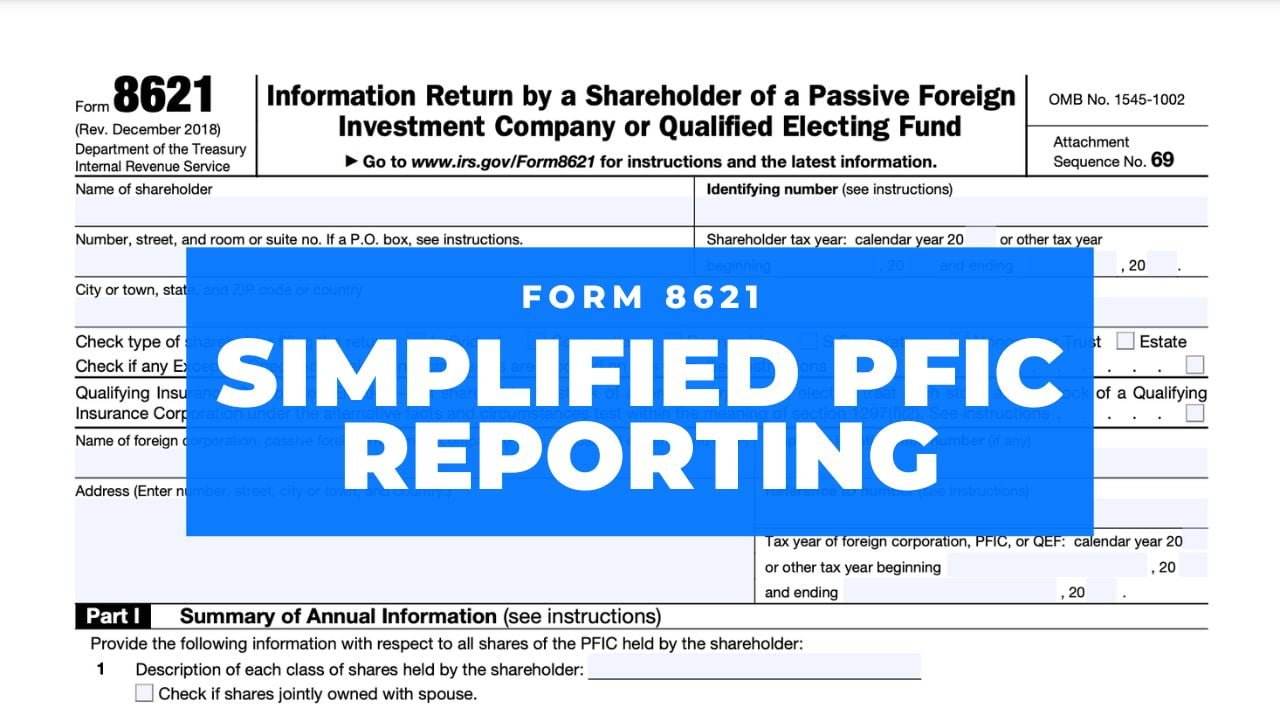
We Make Tax Filing A Breeze
Home » Understanding PFIC Reporting Requirements: Form 8621 for Foreign Mutual Funds

Investing in foreign markets can be an exciting venture, offering potential growth and diversification opportunities. However, it also brings forth a set of complex tax reporting obligations that investors need to be aware of. One such requirement is the Passive Foreign Investment Company (PFIC) reporting, specifically focused on foreign mutual funds. In this blog post, we will delve into the intricacies of PFIC reporting and shed light on the significance of Form 8621, ultimately helping investors navigate this crucial aspect of international investing.
Do you invest in a foreign mutual fund? Watch out – it may be considered a PFIC, or Passive Foreign Investment Company, which means you have additional reporting requirements. Foreign investments can make your U.S. taxes complicated, especially when you throw foreign mutual funds in the mix. Why? Because these accounts — like British mutual funds and Unit Trusts, for example — are typically considered Passive Foreign Investment Companies, or PFICs, and come with additional reporting requirements.
Most American expats understand the reporting requirements that come with U.S.-based investments such as mutual funds. However, they don’t typically know that the foreign mutual fund reporting requirements are much more intricate and come with additional costs for U.S. taxpayers.
A PFIC, or Passive Foreign Investment Company, refers to a foreign corporation that meets certain criteria established by the Internal Revenue Service (IRS). Generally, a foreign mutual fund is categorized as a PFIC. The IRS created PFIC rules to deter U.S. taxpayers from deferring taxes by investing in foreign investment vehicles that generate passive income or appreciate in value over time.
A common question we hear is, “How do I identify a PFIC?”
A common question we hear is, “How do I identify a PFIC?” A key point to understand is that mutual funds from U.S. companies with international investments — like Vanguard, for example — are generally not considered PFICs. If, however, you open a foreign fund with UBS — a Swiss investment company — that fund would be considered a PFIC.
You can generally tell if a foreign corporation or foreign investment fund is considered a passive foreign investment company (PFIC) if it meets one of the following two characteristics:
Passive income is income that is generated passively (through investment vehicles) instead of actively (income earned in exchange for goods and services). Passive income includes:
Passive Foreign Investment Company reporting requirements and PFIC rules are complex and extremely detailed. In general, if you have shares in a foreign mutual fund, you’ll have to report it to the IRS. There are also a few reporting requirements you may have:
Before you jump in, seek the guidance of an expat tax expert, like our Expat Tax Advisors at TheTaxBooks.
Determining PFIC Status: Filing Form 8621 is essential as it helps determine whether an investment qualifies as a PFIC. The form requires investors to provide detailed information about their investment, including the type of investment, the number of shares held, and the income generated. This allows the IRS to assess whether the investment meets the PFIC criteria and apply the appropriate tax treatment.
Understanding the methods of taxation is essential for any investor in foreign mutual funds that qualify as PFICs. Here’s a breakdown:
There are three ways a PFIC can be taxed: Excess distribution, Mark-to-Market (MTM), and Qualified Electing Fund (QEF).
The default taxation method is excess distribution as a §1291 Fund. If you choose this route, you’re taxed on excess distributions and would then realize a gain on the sale or disposition of stock holdings.
With an MTM election, your PFIC’s yearly increases in value are taxed as ordinary gains. At the end of the year, the marketable stock you hold is then treated like you’d sold and repurchased it at its fair market value on that last business day. The value on the last business day of the year will determine the ordinary gains and losses of the fund. Something to note is that if you want to go this route, you need to make that election in the first year. If you don’t, your PFIC will default to being taxed as an excess distribution.
With a QEF election, your PFIC is taxed on your PFIC’s pro-rata share of undistributed earnings for both ordinary income and long-term capital gain. However, this method is tough to employ due to the documentation requirements associated with making the election.
Bottom-line, investing in foreign mutual funds can sometimes be costlier than any economic benefit you might gain. If you can, we recommend you open U.S.-based funds. If you’re dead set on an international fund, it’s important to talk to an Expat Tax Advisor to make sure you’re handling foreign investments in the best way possible. U.S. expat taxes aren’t easy to start with and having a pro by your side can make all the difference to your wallet come tax season.
Penalties for Non-Compliance: Failing to comply with PFIC reporting requirements can result in significant penalties. By submitting Form 8621, investors demonstrate their commitment to tax compliance, reducing the risk of penalties, interest, and potential IRS scrutiny. Furthermore, timely and accurate reporting can help mitigate the potential for future tax-related issues.
Completing Form 8621 can be a complex and time-consuming task, given the detailed information required. To ensure accurate reporting and compliance, consider the following steps:
Foreign mutual fund investments can provide investors with attractive opportunities; however, they also come with a set of taxes.
Ready to file your PFIC reporting requirements? No matter how complicated your U.S. tax return is, there’s an Expat Tax Expert ready to help. Get started with our Expat Tax Preparation today!
To learn more about how you can reduce your taxes and save money, check out the helpful resources on our blog or contact us today to schedule a consultation.